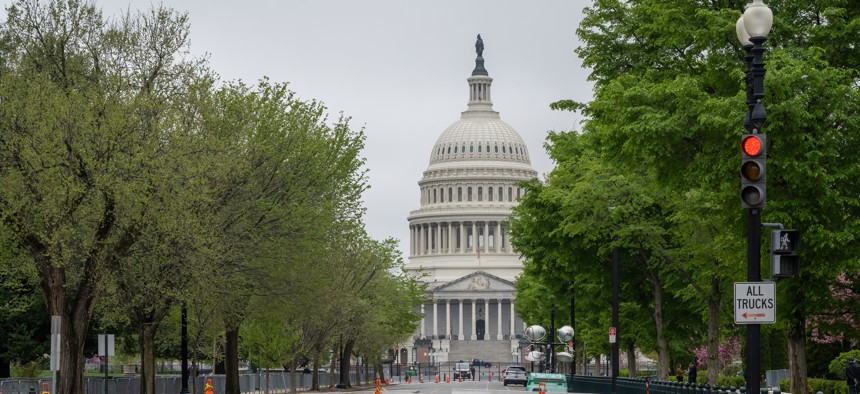
House Speaker Mike Johnson, R-La., has called for more cuts and a fiscal commission. Ayman Haykal/Getty Images
Shutdown worries still loom in the new year, while wildland firefighters welcome a bill removing overtime caps
Pay and benefits news you may have missed.
This time last week, we all breathed a sigh of relief after the House and then the Senate—yet again, at the last minute—passed short-term continuing resolutions to keep the government open and fed pay coming on time.
Well, maybe a very shallow sigh of relief. Most agencies are funded only through Feb. 2, while some -- Veterans Affairs, Agriculture, Energy, Transportation and Housing and Urban Development and construction projects for Defense – remain at fiscal 2023 funding levels until Jan. 19.
Further, after succeeding in eeking out enough votes from Democrats and his fellow Republicans to keep the government going for a couple months, House Speaker Mike Johnson, R-La., has called for cuts that are clearly too much for those on the left and not enough for the ideological right—and so we all face a renewed shutdown threat this winter.
And Johnson favors entrusting how to calculate exactly where and how much to cut to a proposed fiscal commission, particularly for reducing the federal deficit.
The American Federation of Government Employees has slammed the idea, though Johnson and his allies describe it as bipartisan—detecting in the idea untenable cuts for average Americans ahead. And with respect to feds and their compensation, AFGE states that “implementing such a commission would likely be a disaster for federal employees and retirees in the current political environment, where Republicans have been unwilling to consider revenue increases for more than 30 years and have cut taxes on the wealthy,” the union said in a release. “Like past debt commissions, the current proposal would not strengthen our nation’s finances but would finance tax cuts for the wealthy on the backs of working families.”
Firefighters back bill to lift overtime caps
Wildland firefighters are among those feds put in the most precarious financial situations by the continuing chaos on Capitol Hill. The recently passed CRs ensure that—like other feds—at least over the holidays they will get paid. And on time. But serious issues with pay remain for these men and women—despite climate change and increasing impacts from fire and smoke that should have them among the country’s most valued public servants.
In 2021, the Infrastructure Investment and Jobs Act brought about a boost in pay of $20,000 (or a 50% increase, whichever is less) for federal wildland firefighters—feds spread among multiple agencies. This boost continues to this day, but its longer term prospects remain threatened by the same political deadlock that led the government to the brink of shutdown, more than once, in recent months.
The fact that the pay increase is still not permanent is a big problem, says Steve Gutierrez, a business representative for the National Federation of Federal Employees, which represents thousands of wildland firefighters.
“That increase was so long overdue—and it is necessary that Congress makes at least this much permanent,” Gutierrez, who previously served 15 years in firefighting positions with the Forest Service, told Government Executive. “Even with that in place for now, we still see so many people leaving to take firefighting and other jobs elsewhere—and I mean because of pay and that we don’t know where all this headed.”
On a closely related front, the latest pay legislation affecting firefighters on the Hill is raising some hope for Gutierrez and his union. A bill, introduced by Senator Alex Padilla and Rep. Zoe Lofgren, both Democrats from California, would lift overtime pay caps for federal wildland firefighters—and on a permanent basis.
“This could mean—ballpark—easily a $10,000 or more boost for people who have the job of supervising teams in the field,” he said. “That can mean the difference between being able to stay in these jobs—or leaving, as many have had to.”
Currently, Gutierrez says, many such supervisors reach their overtime caps after “just seven or eight days out of each pay period, and after that they put in more days, extra hours, just because if they don’t their teams can’t work and the job doesn’t get done.”
“Look, the fact that these caps are still there is really weird—it really gets in the way,” Gutierrez said. “Passing this bill is needed for recruitment and retention. Our fire line leadership deserves to be paid correctly, including for mitigation and prescribed burn projects, where they are not getting it now. It allows us to achieve goals for us, and the country—keeping wildfires from getting bigger, where we lose more homes and more lives.”
“Every year, wildland firefighters courageously face life-threatening situations in order to protect American communities,” NFFE National President Randy Erwin said in a release urging passage of the bill. “These selfless individuals dedicate endless hours to protect our nation, yet the existing overtime limitations often leave firefighters uncompensated for the full number of hours they are required to work.”
“Although long overdue, this is a positive step in the right direction to offer competitive pay for federal wildland firefighters,” Erwin said. “The federal government must make the necessary investments in our wildland firefighting workforce before we lose more professionals to private, state, and local fire departments.”






